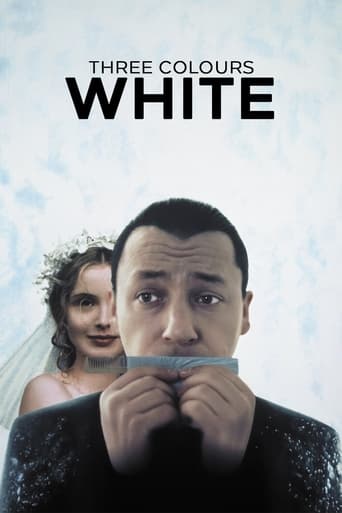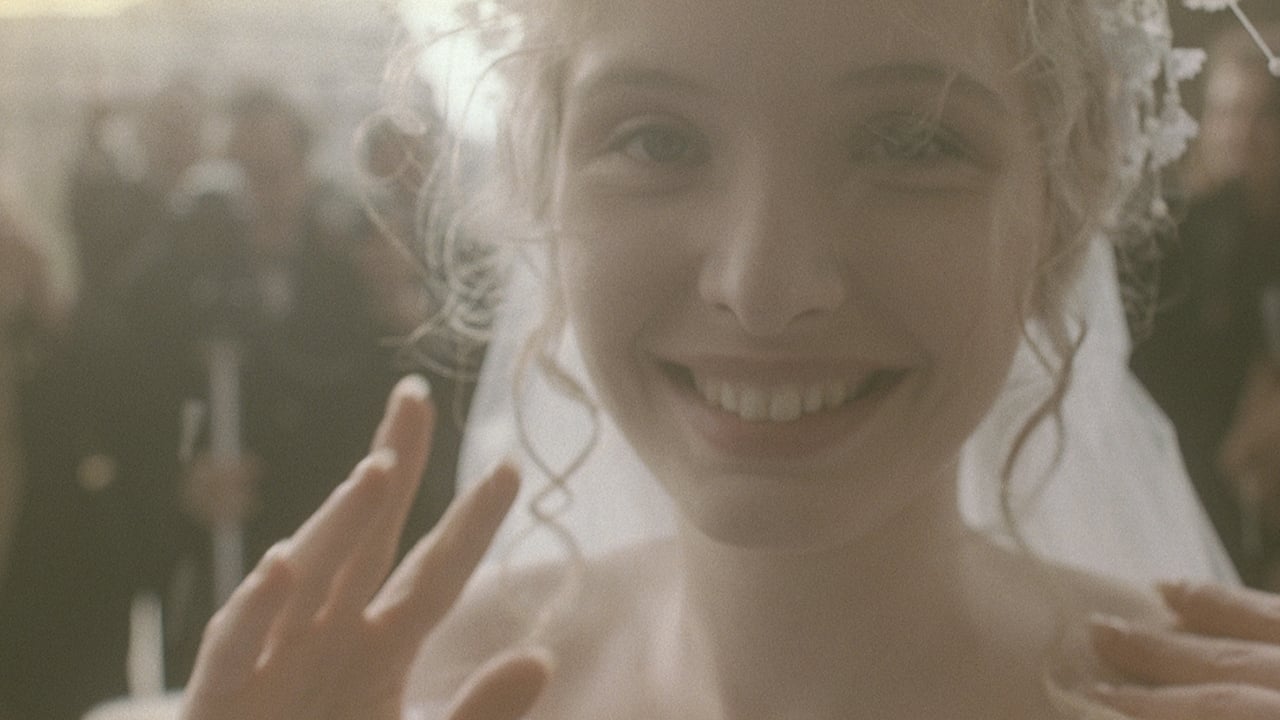TheLittleSongbird
While 'Three Colours: White' may be the weakest of Krzysztof Kieslowski's "Three Colours Trilogy", that is in no way saying that it is a bad film (to me it was actually still an extremely good one) and that it's testament to the trilogy's consistently high overall quality.'Three Colours: White' could have been a little longer to give more development to the two leads' relationship and to Julie Delpy's character perhaps, and there are a couple of parts that do strain credibility. On the whole though, it is an entertaining, sad and thought-provoking examination of equality and revenge with a story detailing love on the rocks and the aftermath of Poland's Communist Regime.Again it is very symbolic, especially in the linking to the protagonist's past (this time with a coin and a Marianna plaster bust) and again the recycling of bottles that ties in with the film's main theme of equality. This symbolism is this said intriguing and visually arresting, instead of being incoherent, one may not get the significance of it at first but reading up about the film and analyses of it has proved to be tremendously insightful.Visually, 'Three Colours: White' is every bit as visually stunning as the previous film 'Three Colours: Blue'. The scenery is intentionally not flattering but at the same time it is also affectionate, and the film is exquisitely shot with the use of colour bold and striking. The music is not quite as symbolic as in 'Blue', but is still very much inspired and cleverly used, with a dark jauntiness to match the blackly comedic nature of the film and also a little pathos to mirror the emotions of the protagonist.Writing is of the true black comedy/dry humour kind, enough to make one laugh heartily and cry unashamedly, with plenty of funny and poignant moments as well as blunt and thought-provoking ones. Kieslowski's direction is never intrusive.Zbigniew Zamachowski excels par excellence in his tragicomic role, a very funny and nuanced turn. Julie Delpy's role is not as interesting, but she does bring a formidable edge and sensuality to it.On the whole, the weakest of the trilogy but still extremely good. 9/10 Bethany Cox
chaos-rampant
User comments for this one are way off the mark. One claims the film is really about marriage, another assigns "stubborn spitefulness" to Delpy (she just wants her man to be able to get it on!), or how it's about French society. Others seem to have taken Kieslowski at face value when he mentioned that each film in the trilogy is inspired by the French motto and try to explain how this is the "egalite" film. Kieslowski may have coaxed funds from the French by giving them something they could buy into in a cultural way (he's pretty much said so) but we have no reason to rest there.The story such as you see it never really happened. Kieslowski makes a point to show us a man being flown to Poland in a suitcase, a hairdresser who is turned into a business mogul just like that, or why Delpy is locked up in prison with no evidence. Blue was about memory, something that happened in the past and now resurfaces to color reality. This one is about imagined anticipation: desire. We have a marriage breaking apart, the courtroom bit is your anchor and probably the only real one. She used to love him until he couldn't get hard any more, but even this might be his failure to save his marriage (a blow to male ego) taking shape as male impotence to consummate.The rest of the film is wish-fulfillment fantasy where he laments himself as broke and homeless, endures all kinds of hardship until he picks himself up, becomes rich and powerful (that's virility for his male ego), watches her cry over his grave and stages his comeuppance after a night of giving her the best sex of her life.But love for her melts away this vindictive fantasy of asserting himself. He never leaves for Hong Kong as planned. He visits her in prison instead. Watching her through theater glasses from below, she motions to him about getting married again. It's all about a narrator living through the illusory reality that desire creates.It resembles an episode from the Dekalog. Like most of the Dekalog, the plot overpower's Kieslowski's visual ability.
athena24
The story was nice but lacks a tight grip and feels unbelievable at times. The weakest point however, in my opinion, is the characters. Karol was nice but I couldn't understand his motives completely and couldn't sympathize with him. As for Dominique, there was not enough character development to understand better who she is. White felt less arty. It does have the camera concentration on object and the returning motive of recycling tin, but not as noticeable. Instead it had a richer plot and slightly more characters. White was never boring, but I didn't have any excitement watching it. The ending left me puzzled as to what Karol wanted to achieve.In summary: above average, but not exciting. When comparing to the other two, it looks like an estranged sibling.
StoryCharts
White is about a jealous husband seeking revenge on his wife by getting her to love him. The irony is that he succeeds in getting her love but the act of getting revenge ruins their chance of a life together as she's thrown in prison.Structurally the story is a bit loose, the revenge plot goes from success to success with no real obstacles while the love relationship also doesn't have many meaningful changes. It feels like the storytellers wanted to really focus on the irony of love/revenge at the end of the film that the journey getting there wasn't fleshed out in a meaningful way. The result is an enjoyable film but not a great film that will likely not warrant a second viewing because the controlling idea is not powerfully proved.The additional sub-plot of the friend seeking suicide because he is bored also does not resonate with the controlling idea much. The film is well shot and composed, but the controlling idea is certainly not proved.My Story Chart of the movie is at storycharts.ca



 AD
AD




